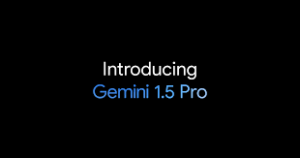In a typical year, Cloud Next conference by Google predominantly showcases closed-source products and services, marking a significant departure from its traditional offerings. However, this year’s conference heralds a notable shift in Google’s approach, as the tech giant introduces a range of open source tools aimed at bolstering generative AI projects and infrastructure.
Unveiling Open Source Tools
A standout release is MaxDiffusion, a comprehensive collection of reference implementations of diffusion models tailored for XLA devices. These models, including the image generator Stable Diffusion, are meticulously crafted to optimize various AI workloads, spanning from fine-tuning to serving. XLA, short for Accelerated Linear Algebra, denotes a technique instrumental in enhancing the efficiency and speed of specific AI tasks, particularly those reliant on tensor processing units (TPUs) and Nvidia GPUs.
In tandem with MaxDiffusion, Google debuts JetStream, an innovative engine expressly designed to execute text-generating AI models. Initially accessible for TPUs, with plans for GPU compatibility in the pipeline, JetStream boasts the potential to deliver up to 3 times higher performance per dollar for models such as Gemma 7B and Llama 2. This advancement underscores Google’s commitment to addressing the escalating demand for a cost-efficient inference stack capable of delivering superior performance in real-world AI applications.
Enhancements to Text-Generating Models
Expanding its MaxText repertoire, Google integrates a diverse array of text-generating AI models, including Gemma 7B, OpenAI’s GPT-3, Llama 2, and models from Mistral. These models undergo rigorous optimization to leverage the capabilities of TPUs and Nvidia GPUs fully, thereby optimizing resource utilization and enhancing energy efficiency. By closely aligning with industry partners such as Nvidia, Google endeavors to empower developers with tools that streamline model deployment and enhance overall performance.
Collaboration for AI Accessibility
In a strategic collaboration with Hugging Face, a prominent AI startup, Google introduces Optimum TPU, a groundbreaking toolset aimed at lowering the barriers to entry for deploying generative AI models on TPU hardware. While the current iteration of Optimum TPU exclusively supports Gemma 7B, Google pledges ongoing improvements to broaden its compatibility and functionality. Future iterations of Optimum TPU will actively support training generative models on TPUs, thereby further enhancing accessibility and scalability for developers.
Through these concerted efforts, Google underscores its commitment to fostering developer goodwill and advancing its ecosystem ambitions in the dynamic landscape of generative AI. By embracing open source principles and collaborating with industry partners, Google seeks to democratize access to cutting-edge AI technologies and catalyze innovation across diverse sectors.
See also: Gemini 1.5 Pro By Google Now Available For Public Preview On Vertex AI


















